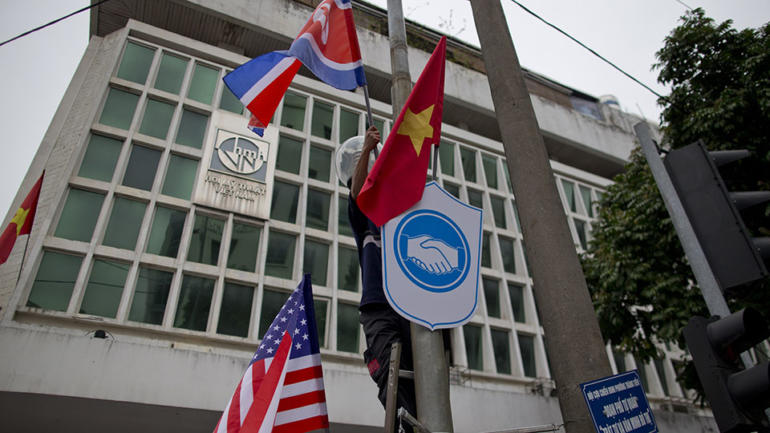One of Donald Trump’s aims for his second summit with Kim Jong Un is exploring investment opportunities. It’s a potential path their host, Vietnam, has already been treading.
Like the DPRK, Vietnam once fought a devastating war with the U.S. But peace gave way to friendship and burgeoning economic ties—even if Trump is testing the latter.
CGTN’s Owen Fairclough reports.
Apple’s wireless AirPods – they’re everywhere – but unlike the iPhones they connect, not made in China. Lower labor costs have helped Vietnam become the cheaper alternative, in some cases, to its powerhouse neighbor.
And the U.S. – the number one Western destination for its goods – is taking notice.
When Vietnam hosted 2017’s annual gathering of Asia – Pacific countries, President Donald Trump told delegates: “In the early 1990s, nearly half of Vietnam survived on just a few dollars a day, and one in four did not have any electricity.”
Today, an opening Vietnamese economy is one of the fastest-growing economies on Earth. It has already increased more than 30 times over, and the Vietnamese students rank among the best students in the world.
And that is very impressive.
Even so, Vietnam has to tread a careful path with Washington. It runs a widening trade surplus with the U.S.—selling much more than it buys.
And that imbalance meant Hanoi was also in Trump’s sights when he began turning on trade partners he accused of exploiting the U.S.
Not long after taking office, Trump signed an executive order investigating the cause of U.S. trade deficits, so “that we fully collect all duties imposed on important importers that cheat. They are cheaters. From now on, those who break the rules will face the consequences, and there will be very severe consequences.”
But Vietnam has been able to exploit what essentially became a U.S. trade battle with China. Those Apple AirPods were reportedly outsourced to Vietnam so the Chinese-based manufacturer could evade potential tariffs on them when they were exported to the U.S.
And if Vietnam wants strong trade ties with the U.S., it also likes the kind of free trade deals Trump hates—signing up to the Pacific free trade pact the U.S. President abandoned.
 CGTN America
CGTN America
 A man installs flags of North Korea, the U.S and Vietnam on a post in a street neighboring Government Guesthouse and the Metropole hotel ahead of the North Korea-U.S. summit in Hanoi, Vietnam, Monday, Feb. 25, 2019. The second summit between U.S President Donald Trump and North Korean leader Kim Jong Un will take place in Hanoi on Feb. 27 and 28. (AP Photo/Gemunu Amarasinghe)
A man installs flags of North Korea, the U.S and Vietnam on a post in a street neighboring Government Guesthouse and the Metropole hotel ahead of the North Korea-U.S. summit in Hanoi, Vietnam, Monday, Feb. 25, 2019. The second summit between U.S President Donald Trump and North Korean leader Kim Jong Un will take place in Hanoi on Feb. 27 and 28. (AP Photo/Gemunu Amarasinghe)
